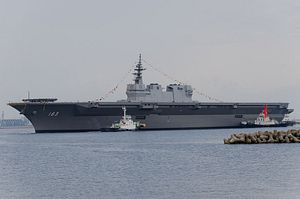As usual, a few curated defense and security links to wrap up this week in APAC:
The US Naval Institute’s blog reports on the formal entrance into service of Japan’s largest post-Second World War warship. The JS Izumo, a 24,000-ton helicopter carrier (be sure not to refer to it as an aircraft carrier!), is formally part of the JMSDF and was launched by Japanese Defense Minister Gen Nakatani out of Yokohama earlier this week. The Izumo is well-suited for anti-submarine operations, according to Japanese military personnel who spoke to the Asahi Shimbun and will be regarded with a degree of concern across the East China Sea in China. The Izumo is capable of serving as an at-sea host to U.S. MV-22 Osprey vertical take-off and landing (VTOL) aircraft and, theoretically, the vertical take-off variant of the Lockheed Martin F-35 Lightning II Joint Strike Fighter — an uncomfortable specification that brings this vessel close to meeting the requirements for a formal aircraft carrier. Japan remains constitutionally barred from investing in defense equipment for offensive uses, including an aircraft carrier.
The US Naval Institute also describes a new Chinese nuclear submarine design. The design appears “to include a shelter capable of holding a miniature submarine for special operations forces (SOF) not unlike vehicles used to deliver Navy SEALs to shore from U.S. nuclear attack boats,” per the report.
Over at The National Interest, Kyle Mizokami lays out everything you need to know about North Korea’s biological and chemical weapons, including the likelihood that they’d be used in a conflict (hint: almost certainly). Mizokami adds: “North Korean planners will use them as early in the war as possible, when their overall picture of the battlefield is at its maximum. As the war progresses and uncertainty mounts, chemical weapons use will become less productive and even counterproductive.”
Adding to a string of accidents for the Indian Navy in recent years, an indigenously made Indian naval plane crashed in the Arabian Sea, leaving two officers missing. The Indian Navy has faced accidents with such frequency that India’s naval chief, Admiral D.K. Joshi, resigned last year.
Also, if you missed it, I spoke with Flashpoints‘ Dingding Chen on this week’s podcast. We discuss Chinese foreign policy, U.S.-China relations, and public opinion in China. Though it may not feel like it, the podcast has been going on for over a year and has grown quite a bit. Do subscribe on iTunes and leave a review with suggestions for how we can improve things.

































